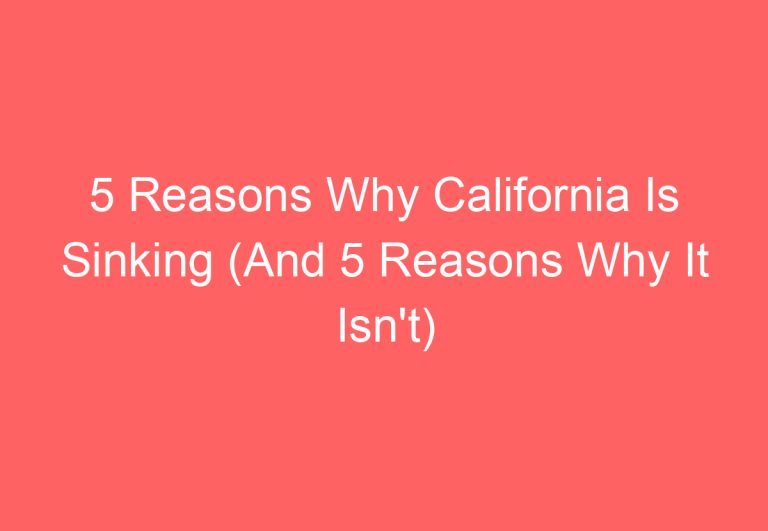4.3 Million Californians Are Fleeing the State—Here’s Why
The Golden State has long been a beacon for people from all over the country, but a recent surge in housing costs and other factors has some wondering if the state is losing its luster. In this blog post, we’ll take a closer look at the data on California’s population and see if there’s any evidence to support the claim that people are leaving the state in droves.
Are People Leaving California
California is facing a mass exodus as people flee the state for a variety of reasons. High cost of living, wildfires, and political unrest are all contributing factors. As a result, the state is losing population and businesses, which is having a negative impact on the economy.
Are People Leaving California?
California is one of the most populous states in the United States, with over 39 million residents. It is also one of the most expensive states to live in, with a median home price of over $600,000. In recent years, there has been speculation that people are leaving California in droves due to the high cost of living.
The Evidence
There is some evidence to support the claim that people are leaving California. In 2020, California lost a net of over 180,000 residents, the largest population decline in the state’s history. This trend has continued into 2021, with the state losing another 117,000 residents in the first six months of the year.
The majority of people who are leaving California are moving to other states in the Western United States, such as Texas, Arizona, and Nevada. These states offer a lower cost of living, more affordable housing, and a more relaxed lifestyle than California.
The Reasons
There are a number of reasons why people are leaving California. The high cost of living is one of the biggest factors. California has some of the highest housing costs in the country, and wages are not always high enough to keep up with the cost of living. The state also has some of the highest taxes in the country, which can make it difficult for people to afford to stay.
Other reasons why people are leaving California include the state’s political climate, traffic congestion, and air pollution. California is a very liberal state, and some people who are more conservative may feel out of place. The state also has some of the worst traffic congestion in the country, and air pollution can be a problem in some areas.
The Impact
The loss of population is having a significant impact on California. The state is losing tax revenue, which is making it difficult to fund public services. The state is also losing out on economic growth, as businesses are less likely to invest in a state that is losing population.
The loss of population is also having a negative impact on California’s culture. The state is becoming less diverse, as people who are leaving tend to be more liberal and non-white. This is changing the character of California and making it less welcoming to people from all walks of life.
The Future
It is difficult to say whether the trend of people leaving California will continue. The state is facing some serious challenges, but it also has a lot to offer. If the state can address some of the factors that are driving people away, it may be able to stem the tide of population loss.
However, it is also possible that the trend of people leaving California will continue. The state’s high cost of living, political climate, and traffic congestion are all likely to remain challenges for the foreseeable future. If this is the case, California could continue to lose population for years to come.
Also Read: Does It Snow California
FAQs: Are People Leaving California?
Are people really leaving California?
Yes, according to a recent study by the California Department of Finance, the state’s population has declined for the first time in over a century. The study found that the state lost 180,000 residents between July 2020 and July 2021, the largest annual decline since 1900.
Why are people leaving California?
There are a number of reasons why people are leaving California, including:
High cost of living: California has some of the highest housing costs in the United States, which makes it difficult for many people to afford to live in the state.
Traffic congestion: California has some of the worst traffic congestion in the United States, which can make it difficult to get around the state.
Environmental issues: California is facing a number of environmental challenges, including drought, wildfires, and air pollution.
Political climate: California has a reputation for being a liberal state, which can be a turn-off for some people.
Where are people leaving California for?
The majority of people who are leaving California are moving to other states in the Sun Belt, such as Texas, Arizona, and Florida. These states offer a lower cost of living, less traffic congestion, and a more moderate climate than California.
Will California’s population continue to decline?
It is difficult to say for sure whether California’s population will continue to decline. However, the state is facing a number of challenges that could make it difficult to attract and retain residents, such as the high cost of living and the environmental challenges.
What can California do to attract and retain residents?
There are a number of things that California can do to attract and retain residents, including:
Invest in affordable housing: California needs to build more affordable housing to make it more affordable for people to live in the state.
Reduce traffic congestion: California needs to invest in public transportation and other infrastructure to reduce traffic congestion.
Address environmental issues: California needs to take steps to address the environmental challenges it is facing, such as drought, wildfires, and air pollution.
Be more welcoming to people from all walks of life: California needs to be more welcoming to people from all walks of life, regardless of their political beliefs or socioeconomic status.






